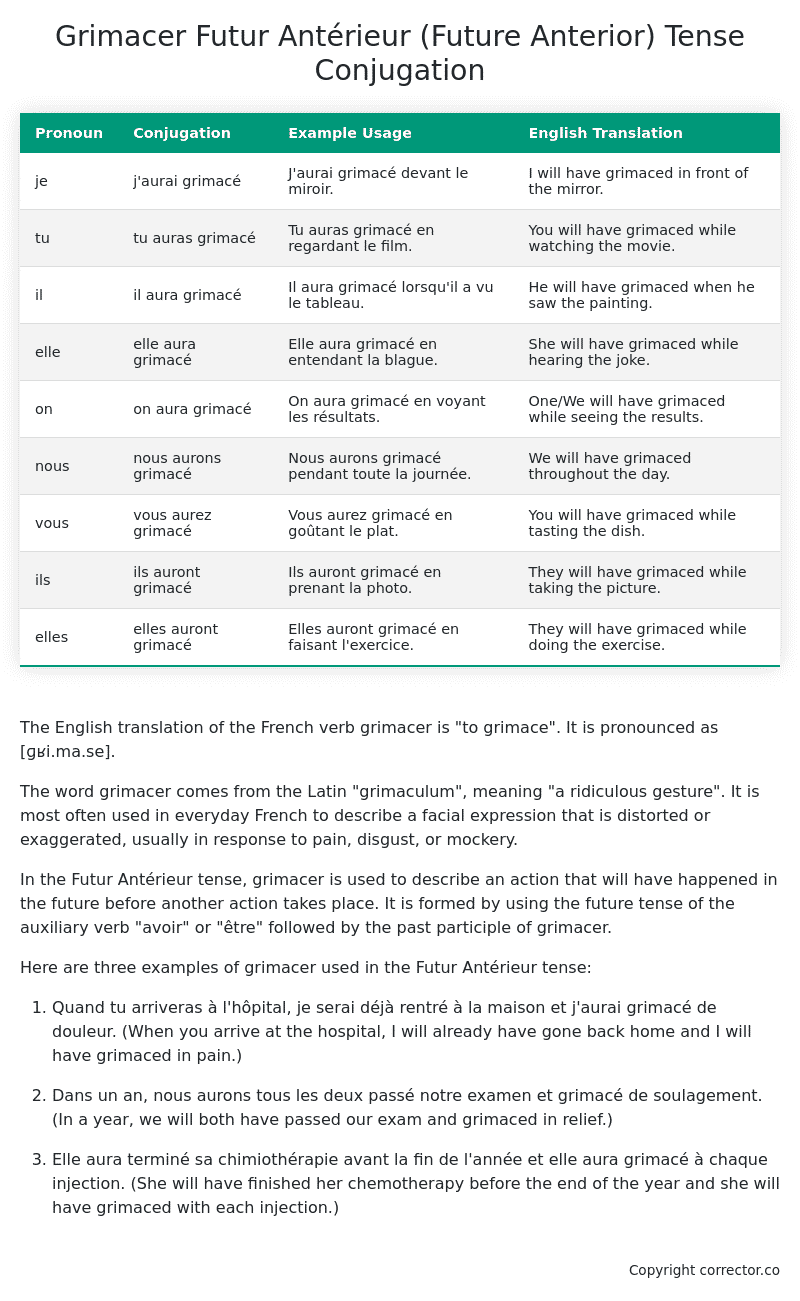Futur Antérieur (Future Anterior) Tense Conjugation of the French Verb grimacer
Introduction to the verb grimacer
The English translation of the French verb grimacer is “to grimace”. It is pronounced as [ɡʁi.ma.se].
The word grimacer comes from the Latin “grimaculum”, meaning “a ridiculous gesture”. It is most often used in everyday French to describe a facial expression that is distorted or exaggerated, usually in response to pain, disgust, or mockery.
In the Futur Antérieur tense, grimacer is used to describe an action that will have happened in the future before another action takes place. It is formed by using the future tense of the auxiliary verb “avoir” or “être” followed by the past participle of grimacer.
Here are three examples of grimacer used in the Futur Antérieur tense:
-
Quand tu arriveras à l’hôpital, je serai déjà rentré à la maison et j’aurai grimacé de douleur. (When you arrive at the hospital, I will already have gone back home and I will have grimaced in pain.)
-
Dans un an, nous aurons tous les deux passé notre examen et grimacé de soulagement. (In a year, we will both have passed our exam and grimaced in relief.)
-
Elle aura terminé sa chimiothérapie avant la fin de l’année et elle aura grimacé à chaque injection. (She will have finished her chemotherapy before the end of the year and she will have grimaced with each injection.)
Table of the Futur Antérieur (Future Anterior) Tense Conjugation of grimacer
| Pronoun | Conjugation | Example Usage | English Translation |
|---|---|---|---|
| je | j’aurai grimacé | J’aurai grimacé devant le miroir. | I will have grimaced in front of the mirror. |
| tu | tu auras grimacé | Tu auras grimacé en regardant le film. | You will have grimaced while watching the movie. |
| il | il aura grimacé | Il aura grimacé lorsqu’il a vu le tableau. | He will have grimaced when he saw the painting. |
| elle | elle aura grimacé | Elle aura grimacé en entendant la blague. | She will have grimaced while hearing the joke. |
| on | on aura grimacé | On aura grimacé en voyant les résultats. | One/We will have grimaced while seeing the results. |
| nous | nous aurons grimacé | Nous aurons grimacé pendant toute la journée. | We will have grimaced throughout the day. |
| vous | vous aurez grimacé | Vous aurez grimacé en goûtant le plat. | You will have grimaced while tasting the dish. |
| ils | ils auront grimacé | Ils auront grimacé en prenant la photo. | They will have grimaced while taking the picture. |
| elles | elles auront grimacé | Elles auront grimacé en faisant l’exercice. | They will have grimaced while doing the exercise. |
Other Conjugations for Grimacer.
Le Present (Present Tense) Conjugation of the French Verb grimacer
Imparfait (Imperfect) Tense Conjugation of the French Verb grimacer
Passé Simple (Simple Past) Tense Conjugation of the French Verb grimacer
Passé Composé (Present Perfect) Tense Conjugation of the French Verb grimacer
Futur Simple (Simple Future) Tense Conjugation of the French Verb grimacer
Futur Proche (Near Future) Tense Conjugation of the French Verb grimacer
Plus-que-parfait (Pluperfect) Tense Conjugation of the French Verb grimacer
Passé Antérieur (Past Anterior) Tense Conjugation of the French Verb grimacer
Futur Antérieur (Future Anterior) Tense Conjugation of the French Verb grimacer (this article)
Subjonctif Présent (Subjunctive Present) Tense Conjugation of the French Verb grimacer
Subjonctif Passé (Subjunctive Past) Tense Conjugation of the French Verb grimacer
Subjonctif Imparfait (Subjunctive Imperfect) Tense Conjugation of the French Verb grimacer
Subjonctif Plus-que-parfait (Subjunctive Pluperfect) Tense Conjugation of the French Verb grimacer
Conditionnel Présent (Conditional Present) Tense Conjugation of the French Verb grimacer
Conditionnel Passé (Conditional Past) Tense Conjugation of the French Verb grimacer
L’impératif Présent (Imperative Present) Tense Conjugation of the French Verb grimacer
L’infinitif Présent (Infinitive Present) Tense Conjugation of the French Verb grimacer
Struggling with French verbs or the language in general? Why not use our free French Grammar Checker – no registration required!
Get a FREE Download Study Sheet of this Conjugation 🔥
Simply right click the image below, click “save image” and get your free reference for the grimacer Futur Antérieur tense conjugation!

Grimacer – About the French Futur Antérieur (Future Anterior) Tense
Construction
Common Everyday Usage Patterns
Interactions with Other Tenses
For example
Summary
I hope you enjoyed this article on the verb grimacer. Still in a learning mood? Check out another TOTALLY random French verb conjugation!


